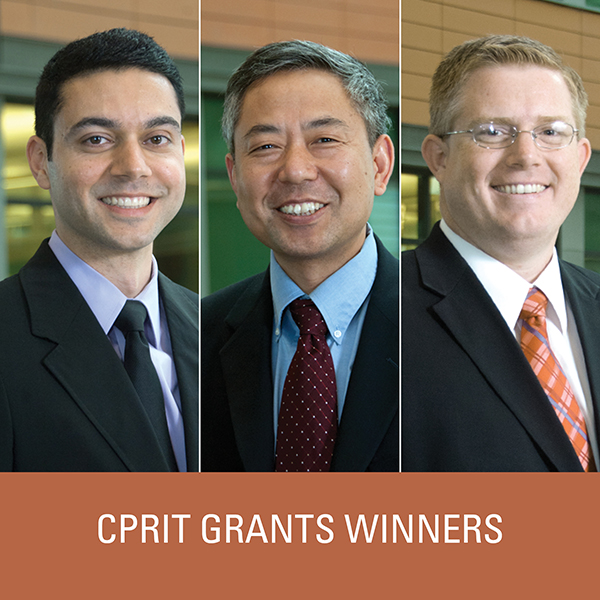UTHealth Houston researchers awarded over $6 million in CPRIT grants

The Cancer Prevention and Research Institute of Texas awarded over $6 million to researchers with UTHealth Houston to aid in cancer research prevention, with nearly half going to McGovern Medical School faculty.
Simultaneous Targeting of LGR4/5/6 for the Treatment of Gastrointestinal Cancer
Researchers with McGovern Medical School are hoping to use their $1 million grant to create drug candidates that are highly potent and effective in killing gastrointestinal cancer cells.
“Gastrointestinal cancers, including colorectal, stomach, and liver cancer, are major causes of cancer-related death in Texas and the rest of the U.S.,” said Qingyun Liu, PhD, principal investigator on the project and professor and director of the Center for Translational Cancer Research at the Brown Foundation Institute of Molecular Medicine for the Prevention of Human Diseases. “In particular, liver cancer is becoming increasingly more common in Texas with few treatment options available. We have identified a peptibody, a protein similar to antibodies, that can specifically bind to a group of receptors on gastrointestinal cancer cells and block their function.”
Researchers hope to attach a cytotoxic payload to the peptibody that will generate a peptibody – drug conjugate that can deliver the payload to and kill cancer cells with high levels of the receptors. “This strategy is similar to that of antibody-drug conjugate which has been successfully used for cancer treatment. Success of this project may lead to the development of novel therapeutics for a broad category of cancers,” Liu said.
Enhancing the Effects of Peptide-Receptor Radionuclide Therapy with a Tumor-Targeted Radiosensitizer
Ali Azhdarinia, PhD, associate professor at the Institute for Molecular Medicine, was awarded a $1 million grant to develop a new method for improving the treatment effects of an already FDA-approved therapy for neuroendocrine tumors.
“A large portion of these patients are already receiving an approved therapy that delivers cell-killing radiation to tumors. The effects of that treatment can be significant, but patients will eventually relapse,” Azhdarinia said.
In collaboration with co-principal investigator Daniel Halperin, MD, from The University of Texas MD Anderson Cancer Center, Azhdarinia has developed a new method to make the tumors more sensitive to the radiation therapy without causing damage to health organs.
“If successful, our research will produce a new type of tumor-targeted treatment that will be used in combination with radiation to maximize antitumor effects and reduce the likelihood of recurrence.”
Quantitative NIRFLI Scanning of Lymphatic Dysfunction in Head and Neck Cancer Patients for Early Diagnosis of Cancer-Acquired Lymphedema
John Rasmussen, PhD, assistant professor at the Institute for Molecular Medicine, will use a nearly $1 million grant to integrate and validate the use of computer vision technology into the near-infrared fluorescence lymphatic imaging system to scan and quantify areas of lymphatic dysfunction in patients with head and neck cancers to guide and monitor response to physiotherapy.
“Head and neck cancers are the seventh most prevalent cancer worldwide, and despite the declining use of tobacco products associated with its incidence, the prevalence of human papillomavirus may be the reason why these cancers are rising worldwide and, in the U.S.,” Rasmussen said.
Under prior CPRIT funding, researchers used NIRFLI in longitudinal studies of head and neck cancer patients to show persistent and progressive lymphatic dysfunction over months and years. In this new grant, researchers will add 3D imaging capabilities to the current lymphatic imaging system to facilitate the quantification of dermal backflow on the head and neck in the clinical setting.
After incorporating the 3D computer vision technology into the system, they hope to run a small pilot clinical trial to assess the response of the lymphatics (and subsequent onset of lymphedema) to treatment over 12 months post cancer treatment.
“If successful, we hope to provide evidence that our imaging technique can detect lymphedema prior to clinical onset and that early treatment prior to onset may prevent the development and/or progression of lymphedema altogether,” Rasmussen said.
Vanessa Schick, PhD, associate professor in the Department of Management, Policy and Community Health at UTHealth School of Public Health in Houston received a nearly $2 million grant for an innovative program that aims to eliminate barriers to education, testing, and treatment for hepatitis B and C among individuals at risk of homelessness. Cui Tao, PhD, professor at UTHealth Houston School of Biomedical Informatics has been awarded $1.3 million to develop an interactive conversational agent to enhance HPV vaccine awareness.
CPRIT grants are given to expand access to clinical trials, incubate innovative cancer research, support the state’s emerging biotechnology industry, provide needed cancer screenings for underserved Texas, and recruit outstanding cancer researchers to Texas.